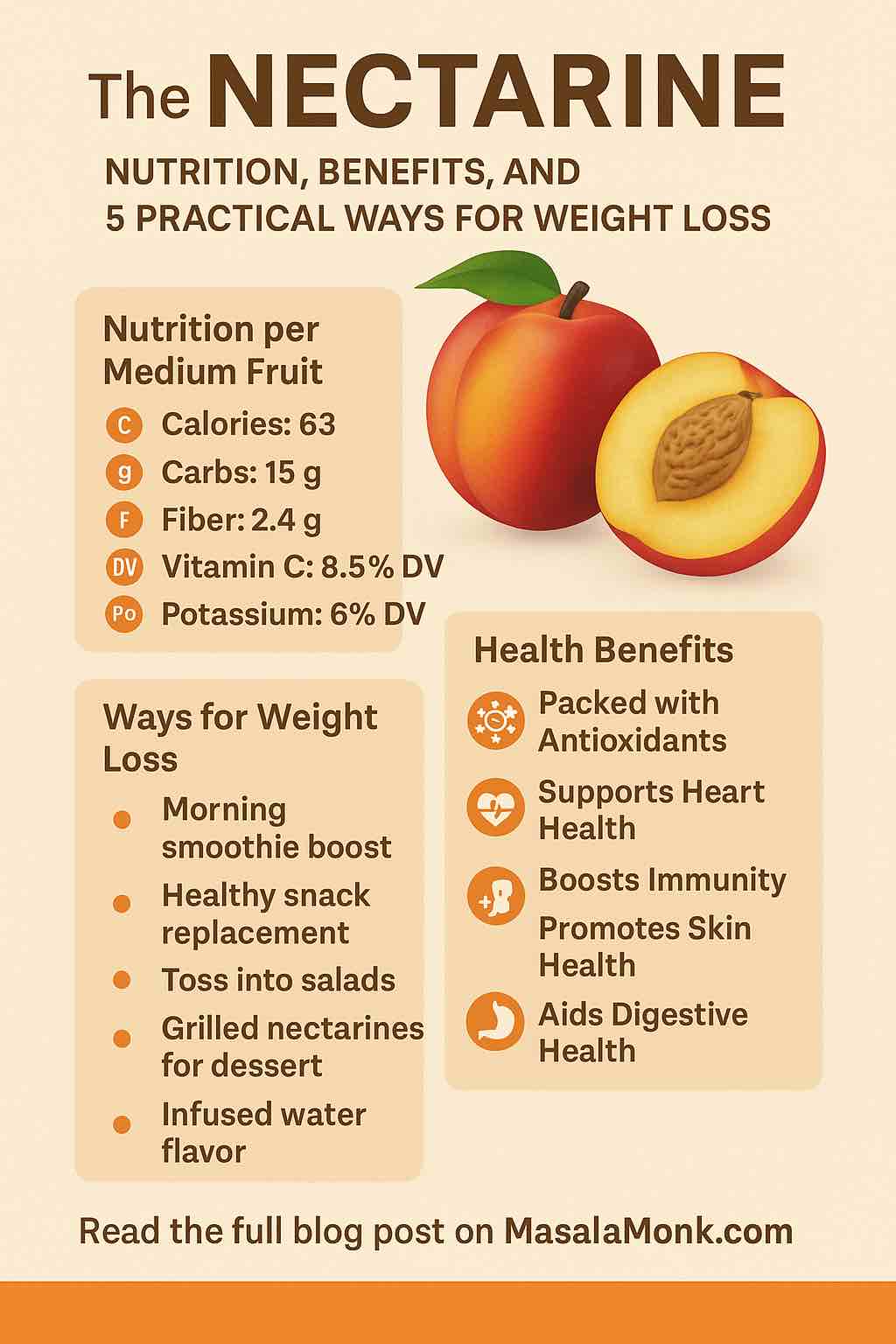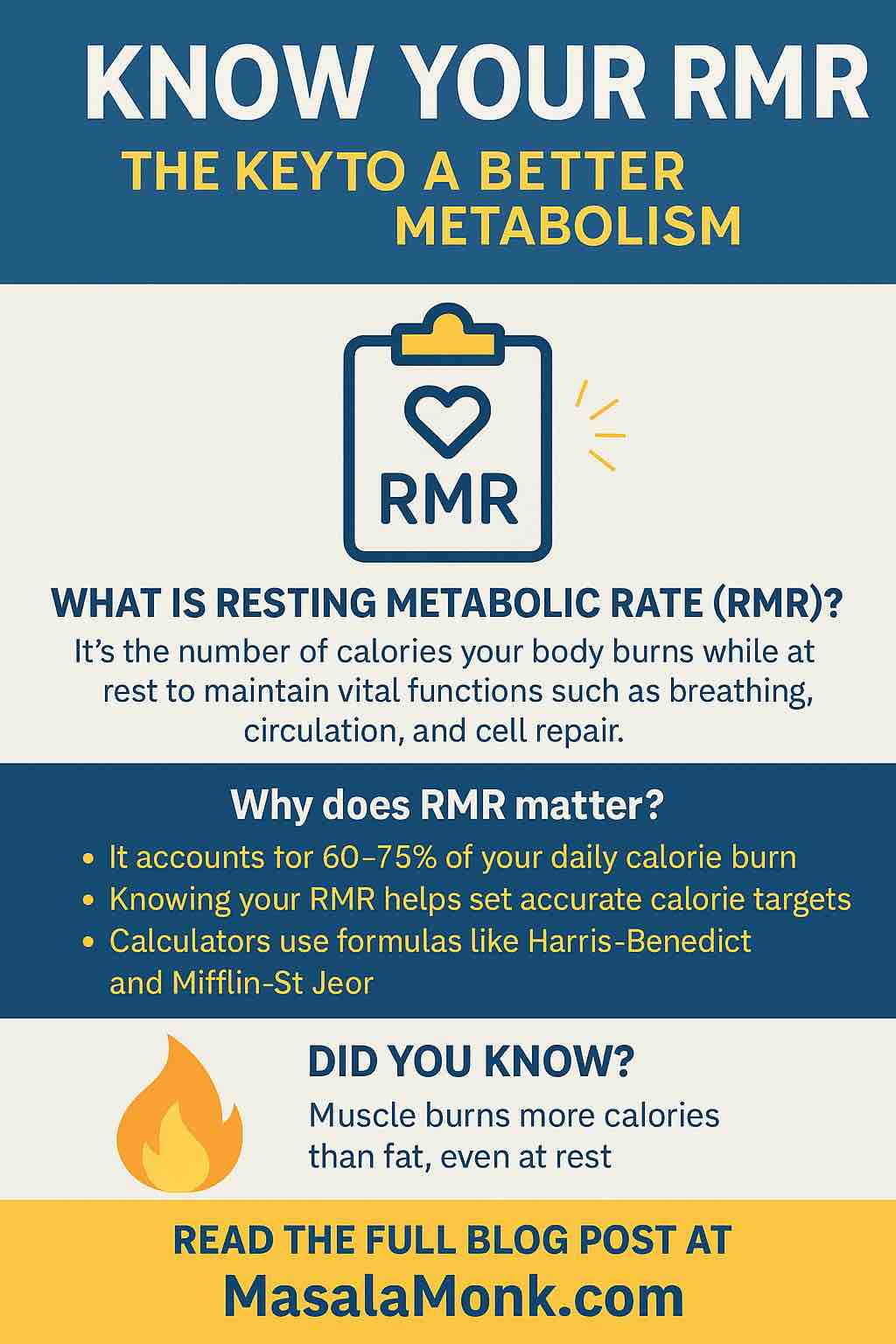
When it comes to delicious stone fruits that combine a juicy sweetness with a subtle tang, nectarines stand out as a favorite. Beyond their delightful taste, nectarines pack an impressive nutritional punch and offer multiple health benefits, especially when it comes to weight management.
In this blog post, we’ll dive deep into the nutrition of nectarines, explore their numerous health benefits, and uncover five practical, actionable ways you can incorporate nectarines into your diet to support your weight loss journey.
What is a Nectarine?
Nectarines are a close relative of peaches, belonging to the same genus Prunus. The primary difference is that nectarines have smooth skin compared to the fuzzy skin of peaches. They come in vibrant shades of orange, red, and yellow and are enjoyed fresh, in desserts, salads, or smoothies.
Nutritional Breakdown of Nectarines
Understanding what’s inside this fruit helps appreciate its benefits.
| Nutrient | Amount per Medium Nectarine (142g) | % Daily Value (DV) |
|---|---|---|
| Calories | 63 | 3% |
| Carbohydrates | 15g | 5% |
| Sugars | 11.2g | – |
| Dietary Fiber | 2.4g | 9% |
| Protein | 1.5g | 3% |
| Fat | 0.5g | <1% |
| Potassium | 285mg | 6% |
| Vitamin C | 5.4mg | 8.5% |
| Niacin (Vitamin B3) | 1.3mg | 10% |
| Copper | 0.3mg | 13.6% |
| Vitamin A | 489 IU | 10% |
Nectarines are low in calories but rich in dietary fiber, vitamins, and minerals — especially vitamin C, potassium, and antioxidants such as beta-carotene and polyphenols.
7 Science-Backed Health Benefits of Nectarines
1. Packed with Antioxidants
Nectarines are loaded with antioxidants like vitamin C, vitamin A (in the form of beta-carotene), and flavonoids including anthocyanins and lutein. These help neutralize harmful free radicals in the body, protecting cells from damage and lowering the risk of chronic diseases such as heart disease and cancer.
2. Supports Heart Health
Potassium in nectarines helps regulate blood pressure by balancing sodium levels in the body. Antioxidants reduce inflammation and oxidative stress, which protects blood vessels and improves cardiovascular function.
3. Boosts Immunity
Vitamin C is crucial for a strong immune system. Regular consumption of nectarines can enhance your body’s ability to fight infections and heal wounds.
4. Promotes Skin Health
Nectarines provide copper, which aids collagen formation, essential for maintaining skin elasticity and preventing premature aging. Vitamin C also helps with collagen synthesis and protects skin from UV damage.
5. Aids Digestive Health
The dietary fiber in nectarines improves digestion by promoting regular bowel movements, preventing constipation, and fostering a healthy gut microbiome.
6. Supports Eye Health
Beta-carotene and lutein in nectarines convert to vitamin A, vital for good vision, reducing the risk of age-related macular degeneration.
7. May Help Regulate Blood Sugar
Though nectarines contain natural sugars, their fiber content slows digestion, helping to prevent blood sugar spikes — beneficial for people managing diabetes.
Are Nectarines Good for Weight Loss?
Absolutely! Here’s why nectarines fit perfectly into a weight loss plan:
- Low Calorie, Nutrient Dense: At just 63 calories per medium fruit, nectarines provide essential vitamins and minerals without adding excessive calories.
- High Fiber Content: Fiber promotes satiety, making you feel full longer and reducing overall calorie intake.
- Natural Sugars for Energy: Nectarines offer a natural source of sugar, which can satisfy sweet cravings more healthfully than processed desserts.
- Hydrating: With a high water content, nectarines help keep you hydrated, which is crucial for metabolism and overall health.
How Many Nectarines Can You Eat Daily?
Moderation is key. One to two medium nectarines daily is generally considered safe and effective for health benefits without excessive sugar intake. If you have diabetes or specific health conditions, consult your healthcare provider.
5 Practical Ways to Use Nectarines for Weight Loss
1. Morning Smoothie Boost
Blend one nectarine with spinach, Greek yogurt, a tablespoon of chia seeds, and unsweetened almond milk. This fiber- and protein-rich smoothie keeps you full through the morning.
2. Healthy Snack Replacement
Swap out calorie-dense snacks like chips or cookies with fresh nectarines. Their natural sweetness satisfies cravings and adds fiber to your diet.
3. Toss Into Salads
Add sliced nectarines to salads for a sweet and tangy flavor. Combine with leafy greens, nuts, and a light vinaigrette for a refreshing, nutrient-dense meal.
4. Grilled Nectarines for Dessert
Grill nectarine halves lightly and sprinkle with cinnamon or a tiny drizzle of honey for a low-calorie dessert that feels indulgent but supports your weight goals.
5. Infused Water Flavor
Add nectarine slices to your water bottle for a subtle fruity flavor. Staying hydrated can reduce hunger and promote metabolism.
Final Thoughts
Nectarines are more than just a tasty summer fruit. Their rich nutritional profile and antioxidant content make them an excellent addition to any health-conscious diet, particularly for weight loss. By incorporating nectarines into your meals and snacks in practical ways, you not only enjoy their sweet and juicy flavor but also harness their health-promoting powers.
Always remember: balance and variety are the keys to sustainable health and weight management. So go ahead, indulge in nectarines mindfully and relish the natural goodness they bring to your plate.
FAQs
1. Are nectarines good for weight loss?
Yes, nectarines are low in calories and high in fiber, which helps promote fullness and reduce overall calorie intake, making them a great fruit to include in a weight loss diet.
2. How many nectarines can I safely eat per day?
Eating one to two medium nectarines daily is generally safe and provides health benefits without excess sugar intake. Consult your doctor if you have specific health conditions.
3. Are nectarines high in sugar?
Nectarines contain natural sugars (~11 grams per medium fruit), which are healthier than processed sugars. Their fiber content helps slow sugar absorption, minimizing blood sugar spikes.
4. What vitamins and minerals do nectarines provide?
Nectarines are rich in vitamin C, vitamin A, potassium, niacin (vitamin B3), and copper, along with antioxidants that support immune function, skin health, and heart health.
5. Can nectarines help improve skin health?
Yes, the vitamin C and copper in nectarines aid collagen production, which supports skin elasticity and reduces signs of aging, while antioxidants protect skin from damage.
6. Are nectarines good for digestion?
The dietary fiber in nectarines promotes healthy digestion by supporting regular bowel movements and maintaining gut health.
7. Can nectarines cause allergic reactions?
Some people sensitive to stone fruits might experience allergic reactions. If you notice itching, swelling, or digestive discomfort after eating nectarines, consult a healthcare provider.
8. Do nectarines have calories?
Yes, a medium nectarine contains about 63 calories, making it a low-calorie option for a healthy snack or part of a meal.
9. How can I incorporate nectarines into my diet?
Nectarines can be eaten fresh, added to smoothies, salads, grilled for dessert, or infused in water for flavor, offering versatile and delicious ways to enjoy them.
10. Are nectarines suitable for people with diabetes?
Nectarines can be included in a diabetic diet in moderation due to their natural sugars, but their fiber helps regulate blood sugar. Always consult a healthcare provider for personalized advice.













